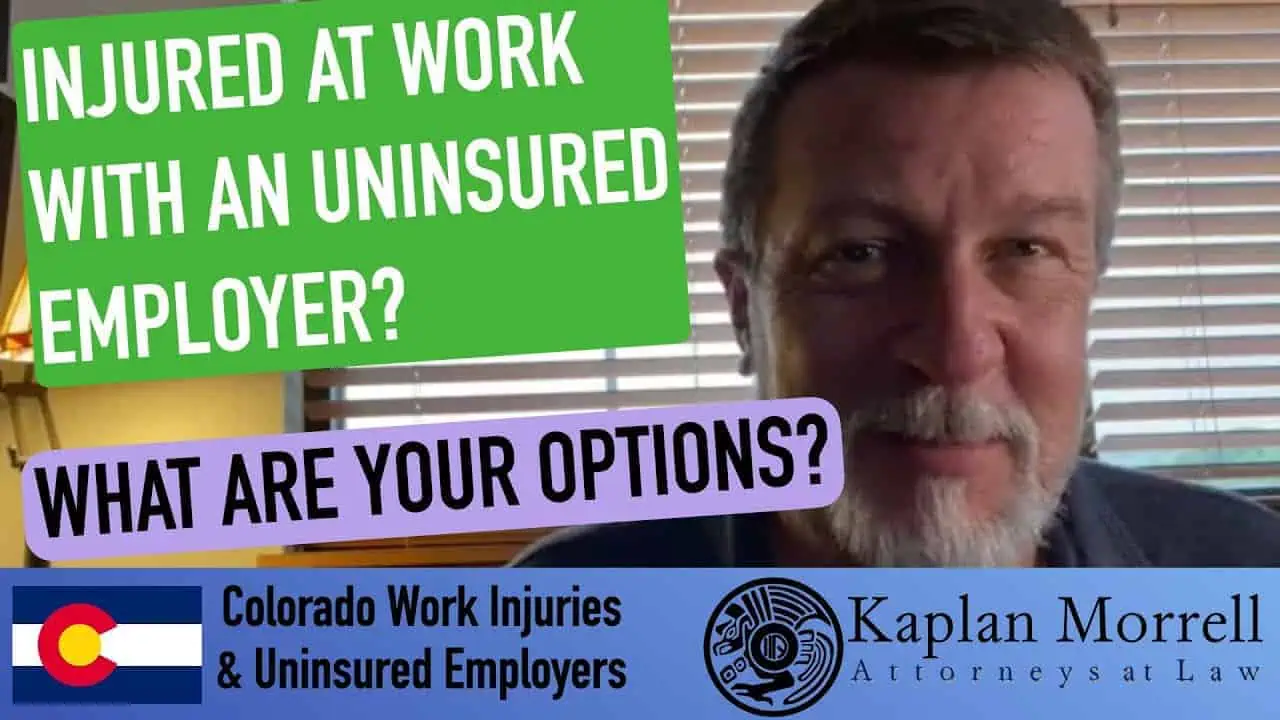Injured At Work And Your Employer Has No Insurance? – What happens when an injured Colorado worker finds out their employer does not carry Workers’ Compensation insurance? What options are there?
Is my employer required to have Workers’ Comp insurance?
Workers’ Compensation is state-required insurance for all employers in Colorado and most other states. If an employer doesn’t carry Workers’ Compensation insurance, they can be penalized and/or fined. However, just because it’s required by law doesn’t mean that people always follow it. We will get calls every now and then from people who say “I was working for this employer and they don’t have insurance.” Now, there’s a website where we can go and verify if the employer has coverage or not, and that’s initially our first step.
What if my employer does not have insurance and I got injured at work?
The biggest problem about getting injured while working for an employer who doesn’t have insurance isn’t getting an order, it’s collecting on the order. A lot of people think their employer must be very rich but some employers don’t have any assets. For example, if all they have is a couple of tools and a few trucks bought with borrowed money, you may be dealing with somebody who doesn’t have assets. You can get an order saying that your employer must pay you $150,000 but if they don’t have $150,000 you’re not going to get paid. If you start going after their accounts pretty soon they’re going to file for bankruptcy.
What are my options if my employer has no insurance?
There are two options in those situations; you should talk with an attorney before you go one way or another.
Option number one
Sue them in court for negligence. If you’re injured on the job you can’t sue your employer even if your injury occurred because they were negligent, however, that’s only true if they carry Work Comp insurance. If your employer does not carry Work Comp insurance and their negligence caused your injury, you can sue your employer. Obviously, this option is only available if your employer was negligent.
Option number two
File a claim in Workers’ Compensation and go after them for benefits. The advantage to this route is the Workers’ Compensation is a “no-fault” system – meaning that you don’t have to prove negligence and your employer doesn’t escape liability even if you were partly at fault.
You can choose option one or two, but not both; it’s one or the other.
What are the advantages of suing your employer who has no insurance for a personal injury?
You can sue for a lot more damages.
- You can recover 100 percent of your lost wages, not just two-thirds for pain and suffering.
- You can also recover future wage loss, which is a lot easier to get in a personal injury lawsuit than it is under Workers’ Compensation.
The bad side of the personal injury route is that it takes a lot longer to take an uninsured employer to court. You have to file suit in a district court, you’ll need to get a lawyer, and they typically charge a third to forty percent of what they get for you, assuming they can get anything for you. It can also be more expensive when it comes to litigating these cases. The jury could agree with you and say “Yes, the employer was negligent, they should pay the medical bills.”
However, if the employer doesn’t have any money they can still file bankruptcy and you are still on the hook for the medical bills from the hospital that treated you. The medical providers are still going to send you the bills despite your court order saying that your employer is responsible for paying.
What are the advantages of filing a Workers’ Compensation claim?
There are a few advantages of going the Work Comp route. It tends to be a lot quicker than filing a lawsuit. In Workers’ Compensation, if you’ve got everything ready to go, you can get in front of a judge between four and six months. Compared to waiting two or three years to get your day in court. It is also typically cheaper to litigate these cases because all you have to do is produce the medical records. You can get them into evidence and you don’t have to call in the medical folks as witnesses to lay what’s called an ‘authentication foundation’ for those documents, which makes it a lot cheaper and easier to present evidence in Workers’ Compensation.
Attorneys who handle Work Comp cases will charge typically between 20 to 25 percent. A lot of attorneys do charge a little more than the standard 20 on uninsured cases because those cases can be riskier. After all, you’ll still have a problem collecting. In other words, you’ve got that piece of paper from an administrative law judge that says you’re owed a certain amount of money, but if they don’t have the money and they declare bankruptcy, you’re stuck with just a nice-looking piece of paper.
Finally, one big advantage to getting an Order that your injury was work-related is that it protects you from any collection efforts by medical providers. The law prohibits medical providers from seeking payment from you.
What is the difference between filing a claim under Workers’ Comp and suing for Personal Injury? Which is better?
There is one big difference between these two options. Once you have an order in Workers’ Comp saying that your employer is responsible for your work injury, the medical providers can’t come after you. If you do a personal injury lawsuit, you won’t receive an order until two or three years and even if you get an order, the hospital can still come after you. In Workers’ Compensation, you will get an order between four and six months. If the hospitals try to make you pay the bill after you’ve been given an order, you can turn the tables and go after the hospital for penalties. You are protected and the medical providers have to send the bills to your employer. That is the biggest difference in terms of what options you have available to you.
Another difference is that you do not have to prove negligence on the employer’s end in Work Comp cases. In a personal injury lawsuit, you have to show that the injury occurred due to the employer’s negligence.
Overall, choosing to file a claim under Workers’ Compensation has a lot more advantages, even though your damages may be less than what you could theoretically get awarded in personal injury.
We’re here to help
When it comes down to it, the route that is best for you depends on the circumstances of your case. It’s something that you need to discuss with an attorney and that’s why Kaplan Morrell has been serving injured and disabled workers in Colorado since 1995. We offer free and confidential consultations so if you or anyone you know has been injured on the job, particularly with an uninsured employer, call Kaplan Morrell at 970-356-9898 or visit our website at https://kaplanmorrell.com for more information.
Connect with Kaplan Morrell
Facebook: https://www.facebook.com/KaplanMorrell/
Instagram: https://www.instagram.com/workcompcolorado/
Twitter: https://twitter.com/kaplan_morrell


